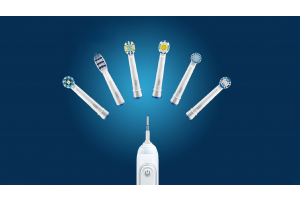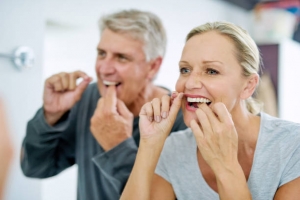
It is vital to perform an effective oral care routine twice a day in order to keep the teeth clean and healthy and to prevent decay. At least 30% of British adults admit that they do not brush their teeth twice a day, most commonly skipping this essential habit at night.
By effectively brushing the teeth and maintaining a good interdental care routine, we are actively preventing the bacteria in the mouth from digesting leftover food debris and plaque from between the teeth and gums. If allowed to, the bacteria will thrive by feeding on the sugars in these food particles. Consequently, this build-up of bacteria can potentially lead to damage and decay of the teeth. The increase in bacteria can also cause the body’s immune system to work harder to fight against the bacteria, triggering pain and inflammation of the gums, all of which can be majorly prevented through conducting good oral care.
How to Improve Your Oral Health Routine at Night-Time?
-Eat a Healthy Snack
If you are someone who takes pleasure in snacking before bedtime, it would be ideal to switch unhealthy, sugary, or acidic snacks to something healthier for your teeth. This includes foods such as apples, nuts, carrots, or celery, all of which are great at increasing saliva production. However, it is essential to make sure you are still brushing your teeth at least 30 minutes after you eat before you go to bed.
-Brush Your Teeth – The Right Way
While it is already evident that brushing the teeth at night can improve oral hygiene, the wrong brushing technique may not be effective enough at achieving this. To ensure that all surfaces of the teeth are covered, brushing should be conducted at a 45-degree angle to the gums. Short up and down strokes should be used whilst consecutively brushing the outer then inner surface of the teeth, making sure to cover all areas of the enamel. If this sounds too difficult to maintain, Dr Barman’s super brush is a unique alternative to the regular toothbrush which can be used to simultaneously brush all surfaces of the tooth, saving you brushing time and resulting in a cleaner smile.
-Avoid Hard Bristles
It is widely encouraged to use an electric toothbrush as it can be extremely gentle yet effective at cleaning hard-to-reach areas in the mouth. Electric toothbrushes are able to brush away more debris and plaque from the teeth than the typical toothbrush. However, if you are a persistent user of a manual toothbrush, it can be useful to invest in a soft bristle toothbrush to prevent damage to the gums during brushing.
-Don’t Forget Interdental Care
Dental floss and interdental brushes have been specifically created to target cleaning in between the teeth. If left uncleaned, particles stuck in between the teeth can cause the formation of plaque which can over time develop into gum disease and decay. These tools have been created to reach areas that typically cannot be reached by brushing alone, to provide a deeper clean.
-Give Your Mouth a Good Rinse
Mouthwash is often misunderstood to be solely used for freshening the breath, however, there is much more to mouthwash than meets the eye. Using specialist mouthwashes such as Gengigel, can help to strengthen the teeth, as well as prevent plaque and soothe the gums while we sleep.
-Stop Grinding Your Teeth
Around 30% of people in the UK have shown signs of bruxism damage, also known as teeth grinding. However, only around 10% are actually aware of this involuntary habit. Teeth grinding can stem from multiple things, including stress or anxiety and can cause headaches and pain in the jaw. It is important to figure out how to stop this as it can be damaging to the teeth, causing the tooth enamel to wear down over time. Using a mouthguard at night provides a barrier between the teeth, helping to protect the teeth against bruxism. As the jaw is clenched, the night guard helps to lighten the tension and to cushion the muscles in the jaw, easing the impact and symptoms of the teeth grinding.









